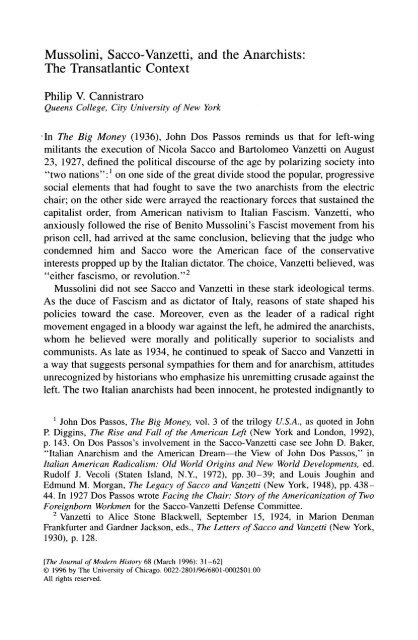Mussolini, Sacco-Vanzetti, and the Anarchists: The ... - Libcom
Mussolini, Sacco-Vanzetti, and the Anarchists: The ... - Libcom
Mussolini, Sacco-Vanzetti, and the Anarchists: The ... - Libcom
Create successful ePaper yourself
Turn your PDF publications into a flip-book with our unique Google optimized e-Paper software.
<strong>Mussolini</strong>, <strong>Sacco</strong>-<strong>Vanzetti</strong>, <strong>and</strong> <strong>the</strong> <strong>Anarchists</strong>:<br />
<strong>The</strong> Transatlantic Context<br />
Philip V. Cannistraro<br />
Queens College, City University of New York<br />
In <strong>The</strong> Big Money (1936), John Dos Passos reminds us that for left-wing<br />
militants <strong>the</strong> execution of Nicola <strong>Sacco</strong> <strong>and</strong> Bartolomeo <strong>Vanzetti</strong> on August<br />
23, 1927, defined <strong>the</strong> political discourse of <strong>the</strong> age by polarizing society into<br />
"two nations": I on one side of <strong>the</strong> great divide stood <strong>the</strong> popular, progressive<br />
social elements that had fought to save <strong>the</strong> two anarchists from <strong>the</strong> electric<br />
chair; on <strong>the</strong> o<strong>the</strong>r side were arrayed <strong>the</strong> reactionary forces that sustained <strong>the</strong><br />
capitalist order, from American nativism to Italian Fascism. <strong>Vanzetti</strong>, who<br />
anxiously followed <strong>the</strong> rise of Benito <strong>Mussolini</strong>'s Fascist movement from his<br />
prison cell, had arrived at <strong>the</strong> same conclusion, believing that <strong>the</strong> judge who<br />
condemned him <strong>and</strong> <strong>Sacco</strong> wore <strong>the</strong> American face of <strong>the</strong> conservative<br />
interests propped up by <strong>the</strong> Italian dictator. <strong>The</strong> choice, <strong>Vanzetti</strong> believed, was<br />
"ei<strong>the</strong>r fascismo, or revolution."2<br />
<strong>Mussolini</strong> did not see <strong>Sacco</strong> <strong>and</strong> <strong>Vanzetti</strong> in <strong>the</strong>se stark ideological terms.<br />
As <strong>the</strong> duce of Fascism <strong>and</strong> as dictator of Italy, reasons of state shaped his<br />
policies toward <strong>the</strong> case. Moreover, even as <strong>the</strong> leader of a radical right<br />
movement engaged in a bloody war against <strong>the</strong> left, he admired <strong>the</strong> anarchists,<br />
whom he believed were morally <strong>and</strong> politically superior to socialists <strong>and</strong><br />
communists. As late as 1934, he continued to speak of <strong>Sacco</strong> <strong>and</strong> <strong>Vanzetti</strong> in<br />
a way that suggests personal sympathies for <strong>the</strong>m <strong>and</strong> for anarchism, attitudes<br />
unrecognized by historians who emphasize his unremitting crusade against <strong>the</strong><br />
left. <strong>The</strong> two Italian anarchists had been innocent, he protested indignantly to<br />
' John Dos Passos, <strong>The</strong> Big Money, vol. 3 of <strong>the</strong> trilogy U.S.A., as quoted in John<br />
P. Diggins, <strong>The</strong> Rise <strong>and</strong> Fall of <strong>the</strong> American Left (New York <strong>and</strong> London, 1992),<br />
p. 143. On Dos Passos's involvement in <strong>the</strong> <strong>Sacco</strong>-<strong>Vanzetti</strong> case see John D. Baker,<br />
"Italian Anarchism <strong>and</strong> <strong>the</strong> American Dream-<strong>the</strong> View of John Dos Passos," in<br />
Italian American Radicalism: Old World Origins <strong>and</strong> New World Developments, ed.<br />
Rudolf J. Vecoli (Staten Isl<strong>and</strong>, N.Y, 1972), pp. 30-39; <strong>and</strong> Louis Joughin <strong>and</strong><br />
Edmund M. Morgan, <strong>The</strong> Legacy of <strong>Sacco</strong> <strong>and</strong> <strong>Vanzetti</strong> (New York, 1948), pp. 438-<br />
44. In 1927 Dos Passos wrote Facing <strong>the</strong> Chair: Story of <strong>the</strong> Americanization of Two<br />
Foreignborn Workmen for <strong>the</strong> <strong>Sacco</strong>-<strong>Vanzetti</strong> Defense Committee.<br />
2 <strong>Vanzetti</strong> to Alice Stone Blackwell, September 15, 1924, in Marion Denman<br />
Frankfurter <strong>and</strong> Gardner Jackson, eds., <strong>The</strong> Letters of <strong>Sacco</strong> <strong>and</strong> <strong>Vanzetti</strong> (New York,<br />
1930), p. 128.<br />
[<strong>The</strong> Journal of Modern History 68 (March 1996): 31-62]<br />
(D 1996 by <strong>The</strong> University of Chicago. 0022-2801/96/6801-0002$01.00<br />
All rights reserved.

















